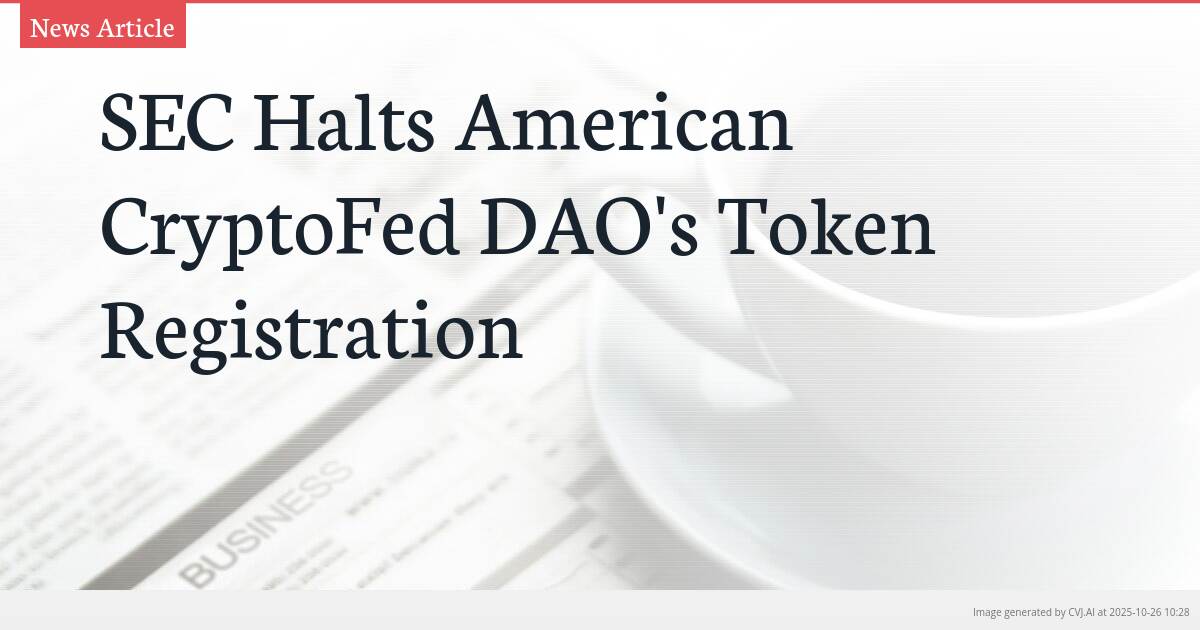This summary text is fully AI-generated and may therefore contain errors or be incomplete.
Introduction
The US Securities and Exchange Commission has initiated proceedings to revoke American CryptoFed DAO’s registration of Ducat and Locke tokens, marking a significant regulatory action against the first legally recognized DAO in the United States. The SEC alleges multiple disclosure violations, including failure to provide essential information about business operations, management structure, and financial condition, highlighting the agency’s intensified scrutiny of crypto projects claiming securities exemptions under Gary Gensler’s leadership.
Key Points
- American CryptoFed is the first DAO to receive legal recognition in the US but now faces potential registration revocation
- The SEC alleges the DAO failed to disclose critical information about business operations and financial standing
- This case is part of the SEC's broader crackdown on crypto companies selling unregistered security tokens
Regulatory Action Against Pioneering DAO
The American CryptoFed DAO, which made history as the first decentralized autonomous organization to receive legal recognition in the United States, now faces potential revocation of its token registration following an administrative proceeding by the US Securities and Exchange Commission. The SEC has moved to evaluate whether a stop order must be granted to revoke the enrollment of the proposal and sale of two crypto assets: the Ducat token, an algorithmic stablecoin, and the Locke token, a governance token. This action represents one of the most significant regulatory challenges to date for a formally recognized DAO operating within the US jurisdiction.
According to the SEC’s declaration, the regulatory action stems from irregularities discovered in American CryptoFed’s Form S-1 registration statement dated September 17, 2021. The commission alleges that the DAO failed to fully disclose critical details about its operations, management, and financial standing, with financial statement audits being among the missing information. The case has escalated due to American CryptoFed’s decision to cease cooperation with the SEC during the examination process, which the regulator identified as its most important observation in the proceedings.
Alleged Disclosure Violations and Legal Disputes
David Hirsch, Chief of the Crypto Assets and Cyber Unit of the SEC’s Enforcement Division, emphasized the fundamental requirement for issuers seeking to register crypto assets as securities transactions. “An Issuer pursuing to enrol the offer and sale of Crypto Assets as Securities Transactions must furnish the Required Disclosure Information to the SEC,” Hirsch stated in the regulatory declaration. The SEC contends that American CryptoFed not only failed to comply with federal securities laws’ disclosure rules but also made what the regulator characterizes as “misleading statements and omissions” in its filings.
The legal dispute centers on conflicting interpretations of the tokens’ regulatory status. While the SEC maintains that the Ducat and Locke tokens constitute securities transactions requiring full disclosure, American CryptoFed asserted that the securities transactions they sought to register were not, in conclusion, securities transactions at all. This fundamental disagreement over classification lies at the heart of the regulatory standoff, with the SEC arguing that American CryptoFed’s litigation position inaccurately refers to the tokens as securities while simultaneously claiming exemption from securities regulations.
American CryptoFed’s COO Xiaomeng Zhou has challenged the SEC’s approach, arguing that the DAO’s Form S-1 filing falls under Sections (a) and 8(b) of the Securities Act of 1933. According to Zhou’s position, the Securities Act only permits the SEC to release a Refusal Order to provide American CryptoFed DAO with additional, clear instructions on how to complete the Form S-1 registration, rather than issuing a Stop Order as the regulator has proposed.
Broader Regulatory Crackdown on Crypto
The American CryptoFed case occurs within the context of the SEC’s accelerated administrative investigations into cryptocurrency companies selling unregistered security tokens. Under the leadership of Gary Gensler, who brings substantial blockchain technology expertise to the role, the SEC has significantly advanced its oversight of Web3 companies and digital asset offerings. The regulator’s action against American CryptoFed follows a pattern of increased enforcement in the crypto space, reflecting Gensler’s stated commitment to applying existing securities laws to digital assets.
The SEC’s intensified scrutiny extends beyond token issuers to include marketing channels and promotional activities. Recent reports indicate the commission has subpoenaed influencers discovered endorsing cryptocurrency projects like HEX, Pulsechain, and PulseX, signaling a comprehensive approach to regulating the crypto ecosystem. This broader crackdown demonstrates the SEC’s determination to enforce disclosure requirements and investor protection measures across all aspects of cryptocurrency offerings, from issuance to promotion.
The outcome of the American CryptoFed proceeding could establish important precedents for how decentralized autonomous organizations and algorithmic stablecoins are regulated in the United States. As the first legally recognized DAO to face such significant regulatory challenges, American CryptoFed’s case may define the compliance expectations for similar organizations seeking to operate within the US regulatory framework while developing innovative blockchain-based financial products.
📎 Read the original article on coincodecap.com

